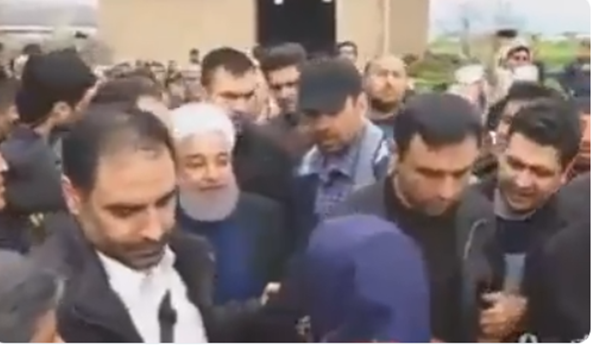
Shiraz (southern Iran), The body of a child lying in the mud after the disaster that killed hundreds of people on a national highway in that city
That’s it: the Supreme Leader has finally reacted! It took a week of severe storms that produced deadly floods across the country for the head of the Islamic Republic to open his mouth if only to express his condolences. And again, instead of solidarity with the Iranian people and the families of the victims, Ali Khamenei offered his condolences to… his special representative in Shiraz!

In circumstances where climate forecasts point to new storms that could worsen the floods, the Islamic Republic’s first priority is to contain popular anger. From 25 March, the regime’s media censored as much as possible the news about the incident, trying to minimize the extent of the loss of life and material damage caused by the floods. Obviously, human lives are not a concern for the clerical regime, which is only concerned about maintaining its power.
One of the first initiatives of the Minister of the Interior, Abdolreza Rahmani Fazli, was not to organize relief operations or forecasts to avoid further damage but to call on the courts to prosecute those who “publish false information” on human losses and damage caused by the floods.

Iranian social media incriminate the State and especially the Guardians of the Islamic Revolution for being at the root of the scale of the disaster. In particular, they highlight the expensive projects of the Islamic Republic’s expansionist policy in the Middle East and the corruption and embezzlement of funds by the regime’s leaders, both of which are at the expense of urban and rural infrastructure, whose role is, among other things, to prevent such disastrous damage during natural disasters.

The example of Shiraz is very significant. While the regime’s media reports of at most 23 deaths in the floods across the country, unofficial sources, including hospital staff, reveal the figure of at least 200 deaths in this historic city alone. Many of its victims lost their lives on the national road that borders the “Koran Gate”, a historic monument built at the entrance to the city.
This national road was built by the Revolutionary Guards in the late 1990s, but to invest as little as possible, it was built on a valley that was used to lead floods to a dry river to avoid such disasters. That is why no construction had been done in this valley until the 1990s. According to Mohammad Darvich, an environmental expert, expert reports at the time warned of the dangers of building a national highway in the valley. The economic benefits then closed the ears that should have taken these warnings into account.
As a result, when the Akbar Abad dam (also owned by the Revolutionary Guards) cracked in the bad weather, the flood washed away hundreds of cars on the highway, crushing them against each other, knocking them over and hitting them at obstacles on the way. Hundreds of people lost their lives in this completely preventable disaster.

After the revelation of the actual number of victims by hospital staff in Shiraz, police forces moved into the city’s hospitals, preventing the unjustified entry of any individual. At the same time, armored vehicles of the Revolutionary Guards have been set up at the main crossroads of the city to ward off any possible revolt by an angry population.
In the meantime, Angry flood victims of a village near the town of Aq Qala in Golestan Province, northeastern Iran, were seen voicing their strong protests on March 27 when the mullahs’ president Hassan Rouhani visited the area after a delay of many days. These angry locals are holding the regime and officials’ incompetence/corruption responsible for the floods.
Aq Qala locals were furious about why no relief aid has been provided after the flood. They criticized regime officials and emphasized how locals were the only individuals actually providing aid to their neighbors. There was no sign of any authorities or state institutions doing their duty, the angry locals added.
On Mar.28, Mrs. Maryam Rajavi renewed condolences to the affected people and called on the public to cooperate nationally to save the besieged people in the flooded areas, to find the missing and help the injured. She called on all people, especially the youth, to confront the flood damage and its catastrophic consequences by creating popular councils in each city, neighborhood, and village as the only way to overcome the effects of a devastating flood.
Mrs. Rajavi once again emphasized that the capabilities of the Revolutionary Guard Corps and the Basij, the army and government apparatus stolen from our people should be made available to the people in order to repair the destructions themselves and to prevent the spread of destruction
On Mar.28, The Revolutionary Guards (IRGC) of the mullahs’ regime voiced grave concerns regarding the revelations made by the Iranian Resistance, the People’s Mojahedin Organization of Iran (PMOI/MEK) in particular, over how the mullahs’ destructive policies are to blame for the vast floods raging across the country.
The IRGC in Fars Province, home to Shiraz, issued a statement on March 27 saying:
“Our sworn enemies, especially the [PMOI/MEK], have once again resorted to spreading rumors and lies to disrupt the judicial process on this subject. Reviewing the source of this lies, it has become certain that the sworn enemies of the Islamic revolution are misusing the recent flood incident with the intention to tarnish people’s minds and create mistrust between the people and the IRGC. In this regard, it is necessary for state institutions to take firm action against such measures, especially those we are witnessing on the internet.”

